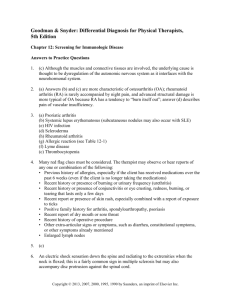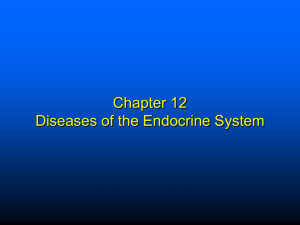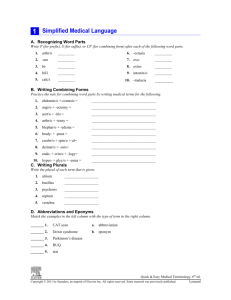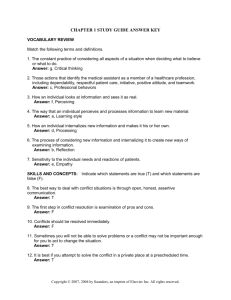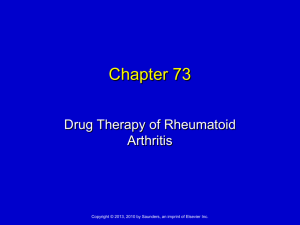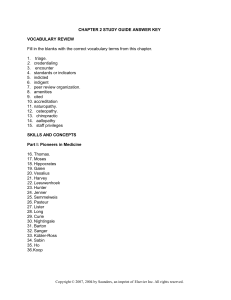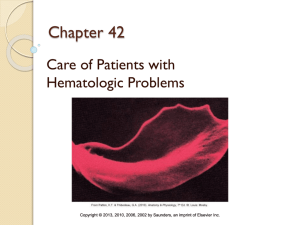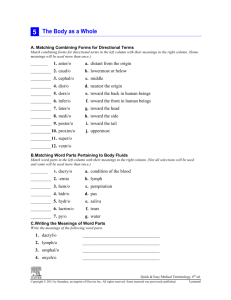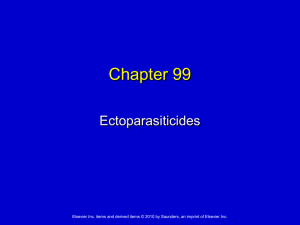Chapter 20, Arthritis and other Connective Tissue Diseases
advertisement
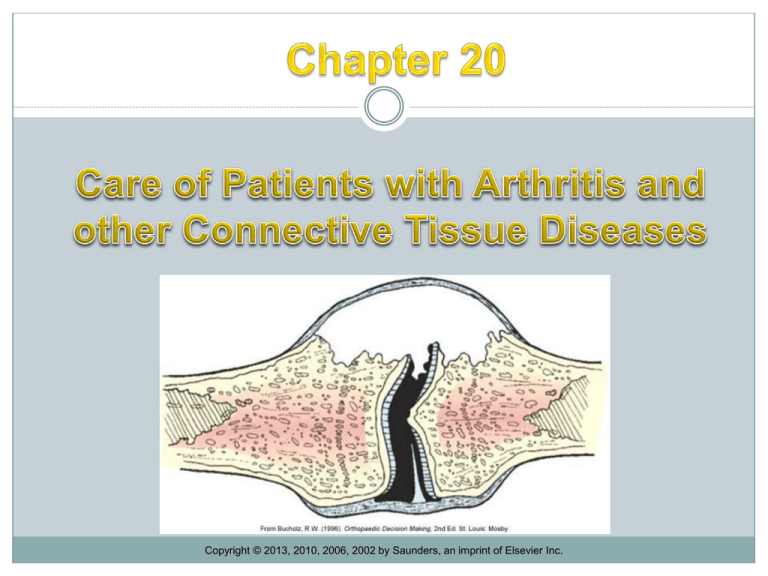
Copyright © 2013, 2010, 2006, 2002 by Saunders, an imprint of Elsevier Inc. Most common arthritis type Progressive loss of cartilage Joint pain, loss of function characterized by progressive deterioration Osteophytes (bone spurs) Cartilage disintegrates, bone and cartilage “float” into joint causing crepitus Copyright © 2013, 2010, 2006, 2002 by Saunders, an imprint of Elsevier Inc. Copyright © 2013, 2010, 2006, 2002 by Saunders, an imprint of Elsevier Inc. History Usually older than 60 years Physical assessment/clinical manifestations: Joint pain and stiffness Crepitus Heberden's nodes Bouchard’s nodes Joint effusions Atrophy of skeletal muscle Copyright © 2013, 2010, 2006, 2002 by Saunders, an imprint of Elsevier Inc. Copyright © 2013, 2010, 2006, 2002 by Saunders, an imprint of Elsevier Inc. Psychosocial Severe pain may cause depression/anxiety Laboratory ESR nsCRP Radiographic Other diagnostic: MRI CT studies Copyright © 2013, 2010, 2006, 2002 by Saunders, an imprint of Elsevier Inc. Drug therapy Rest, immobilization Positioning Thermal modalities Weight control Integrative therapies Glucosamine, chondroitin Copyright © 2013, 2010, 2006, 2002 by Saunders, an imprint of Elsevier Inc. Total joint arthroplasty (TJA) Total joint replacement (TJR) Arthroscopy Osteotomy Copyright © 2013, 2010, 2006, 2002 by Saunders, an imprint of Elsevier Inc. Collaborate with patient/family to become safety partners to prevent complications Hip dislocation VTE Infection Anemia Neurovascular compromise Copyright © 2013, 2010, 2006, 2002 by Saunders, an imprint of Elsevier Inc. Copyright © 2013, 2010, 2006, 2002 by Saunders, an imprint of Elsevier Inc. Copyright © 2013, 2010, 2006, 2002 by Saunders, an imprint of Elsevier Inc. Noninflammatory localized arthritis (osteoarthritis) is not systemic, not an autoimmune disease Inflammatory arthritis: Rheumatoid arthritis Systemic lupus erythematosus Autoimmune disease Copyright © 2013, 2010, 2006, 2002 by Saunders, an imprint of Elsevier Inc. Connective tissue disease (CTD) major focus Noninflammatory or inflammatory Rheumatic disease = any disease/ condition involving musculoskeletal system Arthritis = inflammation of one or more joints Copyright © 2013, 2010, 2006, 2002 by Saunders, an imprint of Elsevier Inc. Common connective tissue disease, destructive to joints Chronic, progressive, systemic inflammatory autoimmune disease; affects primarily synovial joints Transformed autoantibodies (rheumatoid factors) form, attack healthy tissue causing inflammation Copyright © 2013, 2010, 2006, 2002 by Saunders, an imprint of Elsevier Inc. Copyright © 2013, 2010, 2006, 2002 by Saunders, an imprint of Elsevier Inc. Assessment Physical assessment/clinical manifestations: Early—joint stiffness, swelling, pain, fatigue, generalized weakness Late—joints become progressively inflamed and quite painful Copyright © 2013, 2010, 2006, 2002 by Saunders, an imprint of Elsevier Inc. Copyright © 2013, 2010, 2006, 2002 by Saunders, an imprint of Elsevier Inc. Weight loss, fever, extreme fatigue Exacerbations Subcutaneous nodules Respiratory, cardiac complications Vasculitis Periungual lesions Paresthesias Copyright © 2013, 2010, 2006, 2002 by Saunders, an imprint of Elsevier Inc. Sjögren’s syndrome Felty’s syndrome Caplan’s syndrome Copyright © 2013, 2010, 2006, 2002 by Saunders, an imprint of Elsevier Inc. Psychosocial Laboratory—rheumatoid factor, antinuclear antibody titer, ESR, serum complement (C3 & C4), serum protein electrophoresis, serum immunoglobulins Thrombocytosis can occur with late RA Other diagnostic—x-ray, CT, arthrocentesis, bone scan Copyright © 2013, 2010, 2006, 2002 by Saunders, an imprint of Elsevier Inc. DMARDs NSAIDs BRMs Other: Glucocorticoids Immunosuppressive agents E788 awaiting approval Copyright © 2013, 2010, 2006, 2002 by Saunders, an imprint of Elsevier Inc. Adequate rest Proper positioning Ice and heat application Plasmapheresis (not common) Complementary and alternative therapies Promotion of self-management Management of fatigue Enhance body image Copyright © 2013, 2010, 2006, 2002 by Saunders, an imprint of Elsevier Inc. Chronic, progressive, inflammatory connective tissue disorder Can cause major body organs/systems to fail Spontaneous remissions and exacerbations Autoimmune process Autoimmune complexes tend to be attracted to glomeruli of the kidneys Often some degree of kidney involvement Copyright © 2013, 2010, 2006, 2002 by Saunders, an imprint of Elsevier Inc. Skin involvement Butterfly rash Polyarthritis Osteonecrosis Muscle atrophy Fever and fatigue Copyright © 2013, 2010, 2006, 2002 by Saunders, an imprint of Elsevier Inc. Renal involvement Pleural effusions Pericarditis Raynaud’s phenomenon Neurologic manifestation Serositis Copyright © 2013, 2010, 2006, 2002 by Saunders, an imprint of Elsevier Inc. Copyright © 2013, 2010, 2006, 2002 by Saunders, an imprint of Elsevier Inc. Psychosocial results can be devastating Laboratory: Skin biopsy (confirms diagnosis) Immunologic-based laboratory tests CBC (often shows pancytopenia) Body system function Copyright © 2013, 2010, 2006, 2002 by Saunders, an imprint of Elsevier Inc. Topical cortisone drugs Plaquenil Tylenol or NSAIDs Chronic steroid therapy Immunosuppressive agents New drugs in clinical trials Lupozor Belimumab (Benlysta) Copyright © 2013, 2010, 2006, 2002 by Saunders, an imprint of Elsevier Inc. Chronic, inflammatory, autoimmune connective tissue disease Not always progressive Hardening of the skin Classifications: Diffuse cutaneous Limited cutaneous Copyright © 2013, 2010, 2006, 2002 by Saunders, an imprint of Elsevier Inc. Copyright © 2013, 2010, 2006, 2002 by Saunders, an imprint of Elsevier Inc. C—calcinosis R—Raynaud’s phenomenon E—esophageal dysmotility S—sclerodactyly T—telangiectasia Hands and forearm edema with bilateral carpal tunnel syndrome usually first symptoms to occur Copyright © 2013, 2010, 2006, 2002 by Saunders, an imprint of Elsevier Inc. Arthralgia Renal and cardiac system involvement Problems with GI tract Lung involvement Copyright © 2013, 2010, 2006, 2002 by Saunders, an imprint of Elsevier Inc. Drug therapy Identify early organ involvement Skin protective measures Comfort GI management Mobility Copyright © 2013, 2010, 2006, 2002 by Saunders, an imprint of Elsevier Inc. Also called gouty arthritis Urate crystals deposit in joints and other body tissues, causing inflammation Primary gout Secondary gout—hyperuricemia Copyright © 2013, 2010, 2006, 2002 by Saunders, an imprint of Elsevier Inc. Copyright © 2013, 2010, 2006, 2002 by Saunders, an imprint of Elsevier Inc. Drug therapy Nutrition therapy Limit proteins Avoid trigger foods Plenty of fluids pH increased with alkaline foods Low purine diet Copyright © 2013, 2010, 2006, 2002 by Saunders, an imprint of Elsevier Inc. Polymyositis (dermatomyositis) Systemic necrotizing vasculitis Polymyalgia rheumatica and temporal arteritis Ankylosing spondylitis Reiter’s syndrome Copyright © 2013, 2010, 2006, 2002 by Saunders, an imprint of Elsevier Inc. Marfan syndrome Infectious arthritis Lymes Disease Pseudogout Psoriatic Arthritis Copyright © 2013, 2010, 2006, 2002 by Saunders, an imprint of Elsevier Inc. Caused by spirochete Borrelia burgdorferi, resulting from bite of infected deer tick Stages I and II Chronic complications—arthralgias, fatigue, memory/thinking problems Sometimes first and only sign/symptom is arthritis Copyright © 2013, 2010, 2006, 2002 by Saunders, an imprint of Elsevier Inc. Copyright © 2013, 2010, 2006, 2002 by Saunders, an imprint of Elsevier Inc. Skin condition characterized by scaly, itchy rash of elbows, knees, scalp Joints stiff especially in morning Treatment focus = managing pain Copyright © 2013, 2010, 2006, 2002 by Saunders, an imprint of Elsevier Inc. Chronic pain syndrome, not an inflammatory disease Pain, stiffness, tenderness at certain areas of neck, upper chest, trunk, low back, extremities Copyright © 2013, 2010, 2006, 2002 by Saunders, an imprint of Elsevier Inc. Copyright © 2013, 2010, 2006, 2002 by Saunders, an imprint of Elsevier Inc. Severe fatigue for 6 months or longer, usually following flu-like symptoms Four or more criteria must be met for CFS diagnosis Treatment is supportive The patient is a 63-year-old woman admitted to the acute medical care unit. She is 5’4” and weighs 211 lb. Her medical history includes hypertension and GERD. On admission, she reports pain in her hands and joints that is unrelieved by OTC medications. What additional assessment data should you collect from the patient at this time? Copyright © 2013, 2010, 2006, 2002 by Saunders, an imprint of Elsevier Inc. While completing your admission assessment, you observe the patient’s hands appear as shown. 1. How would you document this finding? 2. What do you suspect the patient may be suffering from? Copyright © 2013, 2010, 2006, 2002 by Saunders, an imprint of Elsevier Inc. An hour later, the patient is crying because of severe joint pain in her hands. What are your priority actions at this time? Copyright © 2013, 2010, 2006, 2002 by Saunders, an imprint of Elsevier Inc. While the patient is in pain, her vital signs are taken and recorded. Are any of these vital signs a cause for concern? Copyright © 2013, 2010, 2006, 2002 by Saunders, an imprint of Elsevier Inc. Two hours later, laboratory values are drawn to investigate the patient’s symptoms. The results are: Sodium 136 mEq/L HCT 41.6% Potassium 4.6 mEq/L HGB 12.8 g/dL Calcium 8.9 mg/dL ESR 28 mm/hr Are any of these results of concern? Copyright © 2013, 2010, 2006, 2002 by Saunders, an imprint of Elsevier Inc. Copyright © 2013, 2010, 2006, 2002 by Saunders, an imprint of Elsevier Inc. 50 Which population group is most likely to be diagnosed with fibromyalgia syndrome? A. Men between 30 and 50 years of age B. Women between 30 and 50 years of age C. Men between 50 and 70 years of age D. Women between 50 and 70 years of age Copyright © 2013, 2010, 2006, 2002 by Saunders, an imprint of Elsevier Inc. The assessment of a patient status post total knee arthroplasty for which continuous femoral nerve blockade was utilized reveals that the patient is nervous and vital signs are BP 92/58, HR 62, RR 12, and SpO2 89%. What should the nurse do next? A. B. C. D. Take vital signs every 10 minutes Notify the physician of the vital signs Anticipate administering IV fluids Notify the Rapid Response Team Copyright © 2013, 2010, 2006, 2002 by Saunders, an imprint of Elsevier Inc. During a health history assessment of a patient with RA, chronic HTN, and a recent CVA, she states that she takes 2 fish oil capsules (5 g) daily as a supplement for her RA. What additional question should the nurse ask? A. “Have you found the fish oil to help your RA?” B. “Does your physician know you are taking the fish oil capsules to treat your RA?” C. “Are you taking any anticoagulant medications as well?” D. “How long have you been taking the fish oil capsules?” Copyright © 2013, 2010, 2006, 2002 by Saunders, an imprint of Elsevier Inc.
